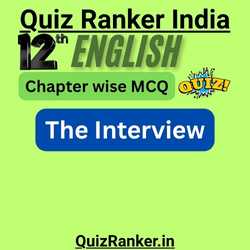Attempt 12th English The Interview MCQ Exam Quiz. Mastering multiple-choice questions requires a solid understanding of the textbook content so download pdf and study for better mark. Although you can also study chapter summaries for quick review.
12th English The Interview MCQ
Short Important Question Answer of English The Interview
Q1. What are some positive views about interviews?
Answer: Some people see interviews as an art form and a source of truth, helping the public know celebrities and thinkers better.
Q2. Why do many famous writers dislike interviews?
Answer: Writers like Naipaul and Kipling believe interviews are intrusive, and can wound the personality of the interviewee or invade their privacy.
Q3. What is the belief in some primitive cultures about photography?
Answer: They believe that taking a photograph steals a person’s soul, similar to how celebrities feel about interviews.
Q4. How does Umberto Eco manage to write so much despite being a professor?
Answer: He uses interstices — small empty moments in daily life — to write. For example, he writes while waiting for an elevator.
Q5. What is special about Eco’s academic writing style?
Answer: Eco writes in a narrative style, telling the story of his research, including his failures and discoveries. This makes it more engaging.
Q6. How does Eco feel about being more known as a novelist than a professor?
Answer: He feels a bit sad because he sees himself as a university professor first, but he accepts that novels reach a wider audience.
Q7. Why was “The Name of the Rose” so successful, according to Eco?
Answer: Eco calls its success a mystery. He believes it just worked at the right time, though publishers were initially unsure.
Summary of 12th English The Interview
The chapter “The Interview” presents an excerpt from the introduction to “The Penguin Book of Interviews” edited by Christopher Silvester. The introduction discusses the nature, functions, and perceptions of the interview as a genre of journalism.
The chapter is divided into two parts. Part I provides an overview of the varying opinions on the interview – some see it as a source of truth and an art form, while others, particularly famous writers, view it as an unwanted intrusion into their private lives. The introduction cites the views of writers like V.S. Naipaul, Lewis Carroll, and Rudyard Kipling, who were averse to being interviewed.
Part II features an interview between Mukund Padmanabhan from The Hindu and the renowned Italian scholar and novelist Umberto Eco. The interview delves into Eco’s diverse scholarly and literary output, his writing process, and the unexpected success of his novel “The Name of the Rose.”
The key points discussed in the interview include:
- Eco’s description of himself as a university professor who writes novels on Sundays, and his identification with the academic community rather than the literary one.
- Eco’s narrative approach to academic writing, which he developed early in his career, and how it later influenced his transition to novel-writing.
- The huge popularity of “The Name of the Rose,” which Eco attributes to an element of mystery and the book’s connection to the medieval period, rather than any conscious effort to appeal to a mass audience.
- Eco’s ability to be highly productive, using the “interstices” or empty spaces in his daily life to write articles and other works.
The chapter highlights the interview as a powerful medium of communication that provides vivid impressions of public figures and personalities.
English MCQs for Class 12 for Board Exams
12th English Prose Chapters MCQ
Chapter 1. The Last Lesson Alphonse Daudet MCQ
Chapter 2. Lost Spring Anees Jung MCQ
Chapter 3. Deep Water William Douglas MCQ
Chapter 4. The Rattrap Selma Lagerlof MCQ
Chapter 5. Indigo Louis Fischer MCQ
Chapter 6. Poets And Pancakes Asokamitran MCQ
Chapter 7. The Interview MCQ
Chapter 8. Going Places A. R. Barton MCQ
12th English Poetry Chapters MCQ
Chapter 1. My Mother At Sixty-Six Kamala Das MCQ
Chapter 2. Keeping Quiet Pablo Neruda MCQ
Chapter 3. A Thing Of Beauty John Keats MCQ
Chapter 4. A Roadside Stand Robert Frost MCQ
Chapter 5. Aunt Jennifer‘s Tigers Adrienne Rich MCQ
12th English Vista Chapters MCQ
Chapter 1. The Third Level Jack Finney MCQ
Chapter 2. The Tiger King Kalki MCQ
Chapter 3. Journey to the end of the Earth Tishani Doshi MCQ
Chapter 4. The Enemy Pearl S. Buck MCQ
Chapter 5. On the face of It Susan Hill MCQ
Chapter 6. Memories of Childhood MCQ
Also Attempt
- Free English Certificate Quiz
- Free IQ Test with Certificate
- Free Skill Test with Certificate
- Free Monthly Riddle Test
You can download 12th NCERT English Books and study for better rank in your exam. You can also view our youtube channel for Class 12 English MCQ Questions and answers or 12th English MCQ pdf download from NERT official website for better marks.


